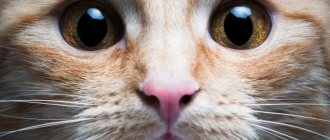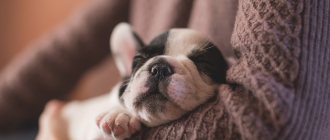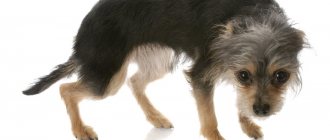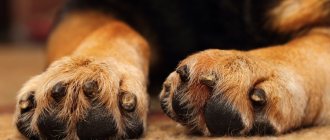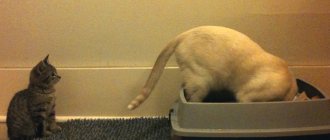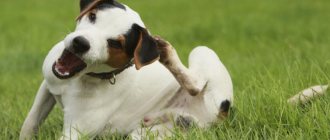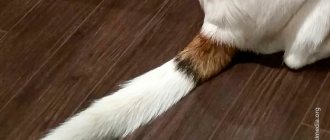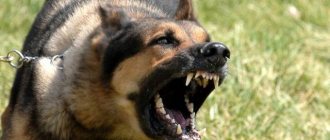There are many reasons to explain this strange behavior of pets. As you know, wolves, who are the distant ancestors of dogs, made shelter for themselves in order to have offspring.
According to such data, one can understand why dogs dig holes in the yard or on any plot of land.
Another factor that causes dogs to act like this is excessive heat, which the pet tries to get rid of by digging holes.
However, this process should not be ignored by dogs, as it creates discomfort.
Predator instinct
Certain breeds of dogs (for example, dachshunds and terriers) instinctively seek out the holes where animals live, but at the same time destroy the entire plot of land intended for growing vegetables and plants.
It is worth considering that an animal can also look for a plant if it suffers from a lack of cellulose in the body.
How to break the habit?
Having discovered dug holes, damaged flower beds and beds, the owner wonders how to stop the dog from digging. Experienced dog breeders and dog handlers recommend the following measures to correct unwanted behavior:
- regularly exterminate rodents on the territory of a country house;
- You should constantly play and exercise with your pet. Active walks and training distract animals from unwanted behavior. Communication with relatives during a walk will benefit the dog;
- To prevent the dog from getting bored in the absence of the owner, a variety of toys, including interactive ones, will help brighten up his leisure time;
- install a special pool for the summer period where the animal can swim in the heat;
- When a dog lives in an apartment, you can wean him off an unwanted habit by setting up his own place for him. In this case, digging of the master's bed stops over time;
- in the event that the reason for digging the earth and digging under the fence is the animal’s unrealized sexual instinct, the owner should consider sterilization or castration;
- If a dog digs its bedding after it has whelped, then the owner should change it. It is obvious that the animal is not satisfied with its condition and smell.
If the unwanted behavior is associated with boredom, household members should devote more time to the pet.
Watch this video about what to do to stop your dog from digging holes in the yard:
Feeling of curiosity
Since dogs are very inquisitive animals that acquire a lot of information through scents, they search for and find objects of interest to them.
In addition, during the process of seeking information, brain activity is stimulated.
In addition to this factor, a dog can engage in digging when it lacks physical activity, which is typical for sporting breeds.Why a dog digs its bed - scientific explanation
Please help me understand the dog.
Marinych
: Please help me understand what is happening to the dog. The dog is the first, all the experience comes only from here, from the forum. The girl turned one a week ago. Two days ago, changes in behavior began - she started digging everything. The sofa, my own mattress, my husband says, I even dug the bed at night, barely calmed me down. It’s not that she does this all the time, but quite often, and it’s somehow difficult for her to distract herself from it. The day before, the claws were trimmed. Unlikely related ( ). False pregnancy? The first heat was from the 10th to the end of October, the nipples (only they) remained enlarged, now the mammary glands are not enlarged, there is no milk. It? He has a good appetite and plays. And further. A couple of days ago I bought her a new squeaking ball, to replace the exact same old one, which no longer squeaked and was completely lost. So, she treats him somehow strangely. No, she doesn’t lick it, doesn’t try to feed it. She brought the old one when she wanted to play, they threw a ball to her, she chased it, brought it, got bored and left it. And then she brings a new one, and whines, so pitifully, just like crying, you throw it to her, she carries it, and whines again, my soul breaks, and carries it again, and whines. Just in case in the evening, when she fell asleep, I hid the ball. And one more thing. Yesterday, during a walk, a certain stray male became attached to us. And he followed us all the way home. Moreover, Kobelino tried to climb on my girl. And she screamed heart-rendingly in my arms the whole way, the dog was already jumping on me, it was a picture. But she's not in heat. How to tie all this into one whole? Is it a fake?
Sannini
: It looks like she is building a nest for future puppies, and the new ball is just her “newborn”, which in addition also makes sounds. I once had a dog who would also pull at the edge of the blanket and sit down as if the puppy was about to come out and pretend to be a mommy very realistically.
Marianne
: Marinych writes:
Is it a fake?
Looks like him.
Feona
: My star had about the same thing. Almost 3 months after the first heat, when there was no sign of anything, she began to dig all her bedding, the sofa, in things thrown on the floor (my son sometimes gets into mischief) and tried to make a nest; she stopped eating tasty morsels - she buried them, hid them, even pieces of meat. Adopted /adopted a rubber squeaky pig, which she used to chew mercilessly. She began to carry it carefully and put it in her dug nests. The appetite was really weak and the mood was sad, unlike your Marinych girl. We went to the doctor - it was a lie. They prescribed “Cat Bayun”. We finished the course and it was all over. By the way, all these almost 3 months after the heat, the males rushed at my beauty like crazy and I couldn’t understand what was wrong, I even bought a special repellent spray. Apparently our girls emit an intoxicating aroma even during falsehoods
Marinych
: Marianna, Sannini, Feona Thank you very much for your answers. I am still re-reading on the forum everything I find about false pregnancy. As I understand it, if this is her, then we don’t have the most severe case yet. Let's take her for walks more. I’ll hide that ball for now too. The question is this. If she doesn't have milk, does she need to reduce her daily food intake and the amount of water? She eats 120-130 grams of acana a day, it seems like it’s not much anyway, giving less water is a real shame, it’s hot here now, +23 during the day, yesterday after a day’s walk I drank half a bowl.
Sannini
: Marinych When this happened in my dogs, especially in cases when milk appeared, stress therapy helped very well - 24 hours without food and water (if you yourself can stand the pitiful, pleading, reproachful glances and sighs), if you can’t stand this, then to calm yourself down, you can give a tablespoon of boiled buckwheat. This advice was once given to me by an old man, a breeder of Russian greyhounds, unfortunately I don’t remember his last name, but I remember his advice, which often helped me and my dogs out of difficult situations for more than 30 years.
Sannini
: Marinych I just noticed with surprise that it is written hot, here the frost is 21 degrees, in addition to what was written above, water should be limited if possible
Dogs digging at home
Owners often wonder why dogs keep digging holes at home.
Often, owners of four-legged friends wonder why the dog even digs up the bed in the house. The main reason is basic boredom or a feeling of loneliness. The animal hopes that its owner will notice it and pay attention to it.As for the connection between digging and a dog’s pregnancy, on the eve of giving birth, the female, at the level of maternal instinct, prepares to ensure that after giving birth she will provide a place for future puppies.
It's about instinct
So, why do dogs dig their bed before they lie down? It turns out that this is a deeply instinctive trait, embedded in every puppy since ancient times. A veterinarian I know told his wife that dogs scratch their beds because they want to “mark the space with their unique scent.”
Essentially, we are dealing with a deeply rooted territorial instinct. Just as dogs urinate on objects, believing them to be theirs, they scratch and dig at various objects with their paws for the same reason. According to the veterinarian, pets have glands in their paws that leave a special smell: thus, their bed or any other surface is considered their territory.
Paul McCartney's eldest grandson looks like his copy in his youth: photo
Is it possible to baptize a baby on Epiphany on January 19: it turns out that this is allowed
Drones made from pineapple waste are stronger and more environmentally friendly than synthetic ones
As a result, dogs are proud to smell the place they have made their own. Of course, if your pet destroys your bed, just say “Ugh!” - so he will understand that this thing is not his property. In this case, be sure to provide him with his own bed.
How to get rid of this situation?
There are only two ways to actually eliminate the problem of your pet digging holes.
The first way is to get rid of the root cause of which the dog acts this way, and the second is to teach it to dig holes in another place where this process will not cause inconvenience to the owner of the four-legged friend.
The dog doesn't feel well
If the dog cannot settle down for a long time, constantly gets up and lies down, you should be wary. The reason may not be related to instincts, but may indicate health problems with the pet. The dog may be suffering from arthritis or other neurological problems, especially if the animal is old. These animals, like people, suffer from joint pain as they age.
If a puppy or young dog behaves this way, then this is the result of stress. Stress can be caused by restrictions on freedom of movement, aggressive behavior of owners, and lack of attention.
Contact your veterinarian if you notice changes in your pet's behavior and habits.
So, in ancient times, the ancestors of dogs circled and dug the ground, creating rookeries in order to ensure a comfortable and safe rest. This habit helped to survive and adapt to the harsh conditions of life in the wild. This behavior is called adaptive; it remains in the memory of descendants at the level of instincts, even after it has lost its meaning.
Photos of dogs
Help the project, repost

0
Every dog has a den!
Let's start by debunking guesswork and assumptions. Wild dogs, and our pets descended from them, live in dens. Unlike burrowing animals, a dog only needs a small depression in soft earth or under a hillock. The main purpose of equipping a den is to hide from the eyes of predators and sleep.
It is important to understand that a dog that lies with its eyes closed may not be sleeping, but dozing. In a state of drowsiness, the animal hears everything and senses the approach of a person/animal. In a state of sleep, the dog does not see, hear or smell. Deep sleep is the most vulnerable period for wild animals.
A den is convenient and even necessary for “waiting out” bad weather or extreme heat , because no one will help a wild animal if it is unwell. Having received a heatstroke, the dog will most likely die, and a small cold will leave the predator without a hearty meal. For domesticated pets this may be a small thing, but for a wild dog it is a threat to survival.
The den is needed to protect the offspring. A wild mother dog cannot protect her puppies all the time; she needs to drink, hunt and take care of herself. Puppies are left without protection and care for several hours at a time and their only chance of survival is secrecy.
My dog is tearing up the sofa. What to do?
Contents hide
One of the most common problems dog owners face. Often everything happens in the midst of complete prosperity: it seemed that nothing foreshadowed trouble, but the owners, once returning home, find a picture of complete defeat. The dog sits nearby and seems ready to suffer a well-deserved punishment.
But don’t rush to blame your pet; it’s better to ask yourself – have you done everything to prevent such incidents? Dogs naturally have the ability to chew anything that gets under their “hot paw” (or fang). More often they do this because of banal boredom and lack of demand, less often because of stress and increased anxiety. Pets can chew and damage almost everything - from the sofa in the living room to shoes and house slippers. Both wood and pillows in the master bedroom are equally susceptible to sharp dog teeth.
Preventive measures are extremely simple: the dog must be given the opportunity to release accumulated energy. In addition, you should diversify her leisure time. It’s not for nothing that in pet stores we see a wide variety of so-called chewing toys. The pet should receive constant physical activity, be busy, and solve problems for mental stimulation. The above is especially true for pets of hunting and service breeds. Idleness and boredom inevitably lead to numerous behavioral problems.
How to keep your pet off the couch? Here are a number of simple tips and recommendations for your attention.
First. Take your pet for walks regularly. Try to diversify your walks as much as possible, filling them with physical exercise and active games. Don't turn your walks into a quick walk around the nearest bushes. As experts say, don't let a dog be a dog. Let your pet fully splash out the accumulated energy outside the home.
Second. Wean your pet off being near furniture and household items. The pet, being a naturally pack animal, sees the owner as a leader, the leader of the pack. Show will and authority, do not give any concessions. Buy your dog his own rug or mattress, make sure he rests there and not on the common sofa. Take the issue seriously. “Starting tomorrow, the sofa becomes taboo.” Avoid cruelty. When you find the dog on the sofa, simply point to the rug with a gesture and tell him where he needs to lie so that the owner is “satisfied”. At first, if the dog loves the sofa with all his heart, place the rug in close proximity to it. When training, use the good old method of positive reinforcement. Give a treat every time your pet “voluntarily” jumps off the couch and settles down where it needs to be. In the case of “unintelligible” pets, act more decisively: remove the animals from the sofa and place them directly on the rug. We repeat: only without rudeness and physical punishment.
Third. Use so-called deterrents for dogs. They are sold in spray form. You spray a surface that your dog is partial to. Don't worry: you won't smell any unpleasant smell, only dogs can detect this smell. As you know, our four-legged friends have a delicate, sensitive sense of smell. Ask for such products at pet stores.
Fourth. When leaving home, leave your pet chewing toys (preferably an assortment). A supply of such toys will never hurt; your pet will always find a place to apply his strengths, skills and abilities. Toys with treats inside are of particular interest: the dog will spend energy “fighting” the toy (or even searching for it), and will be rewarded for his efforts. And we solve the main problem: we save the sofa and other furniture from destruction.
Material used: Stop Your Dog From Destroying A Couch. Author: Betsy Gallup. Source and photo: cuteness.com
Why do dogs scratch the floor?
This question has several variations; one of the most popular and confusing indoor dog owners: "Why do dogs scratch the carpet?" This is a question that will scare people forever. After all, the dog is inside! The surface it scratches, be it carpet, tile or hardwood, is not a malleable material. We get frustrated because the carpet is torn or mangled and other surfaces may need buffing or buffing, or worse, retain claw marks.
Cat owners buy their pets cat trees and scratches, but there are few such provisions for these puppies and dogs. Some breeds or types of dogs, terriers and hounds among them, are accustomed to digging and rummaging, whether for prey, security, or scent detection. If your dog is a burrowing species but spends most of his time alone and indoors, he is being denied his fundamental identity. Giving her more time outdoors, in the yard or at the dog park, can help her fulfill a basic need.
Dogs that scratch the carpet may do so as part of sleep preparation. Dogs don't care about the aesthetic integrity of your home decor. Like turning or twirling, scratching serves a number of practical purposes, at least one of which is related to sleep. This may be part of an instinctive sleep ritual associated with her favorite resting place. The mug fills the area with the scent of the dog several times. Scratches can serve a similar function, physically marking and requiring staining. Dogs are as many creatures as we are. I have seen my own dogs rehearse the entire pattern: scratch, circle and rest.
Why did dogs walk in circles before lying down?
Sometimes her turning radius is as tight as her 3-by-2-foot dog bed in the winter, and others as wide as the spot against the fence outside in the summer. No matter what time of year it never fails to fascinate me as I watch my dog twirl around his chosen sleeping spot. What motivates her to spin before heading off to rest? Like my own personal bedtime rituals, walking in a circle creates a dog's comfort in several ways.
Long before dogs could snuggle up in our beds or had their own dog beds, circling was a means of providing safety and comfort. In nature, a chosen place around is one of the methods used by dogs to ensure the exclusivity of their sleeping place. Trampling on tall grasses or leaves creates enough disturbance to drive away any creatures that may be hiding there, such as the odd snake, rodent or insect.
Circles are also a safety measure. There are several little known or prominent features on a dog's paw pads. They are one of the few surface areas of a dog's body that have sweat glands. More related to this issue, dogs' paws also have scent glands. Taking a few turns around your preferred sleeping area—be it a spot of dirt or the right bed—means that the dog's scent notices. If you've ever seen an old Western movie where a group of pioneers "circle the wagons," a dog's curling may serve a similar protective function. This allows the dog to explore his area before settling down.
